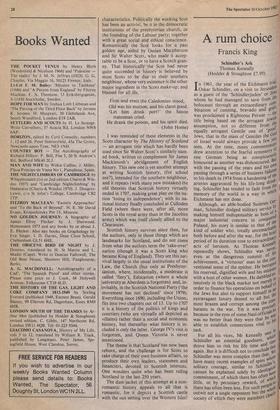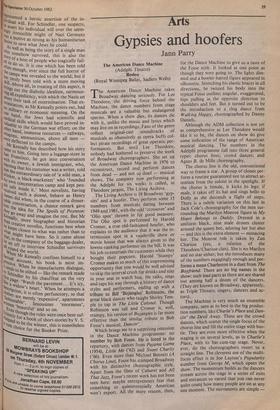A rum choice
Francis King
Schindler's Ark Thomas Keneally (Hodder & Stoughton £7.95) In 1961, the year of the Eichmann
Oskar Schindler, on a visit to Jerusalem as a guest of the `Schindlerjuden' or Jews whom he had managed to save from the holocaust through an extraordinary coil' bination of cunning, bravado and graft' was proclaimed a Righteous Person —the title being based on the arrogant Jewish assumption, not so different from the equally arrogant Gentile one of ‘gocw,: Jews, that in the mass of Gentiles the GO`: of Israel would always provide a few Ps' men. At the time, many commentators, drew attention to the fearful symmetry °,/ one German being as conspicuous' honoured as another was dishonoured. 13'11 with the passing of the years and his °gin passing through a series of business failures to his death in 1974 from a hardening of the arteries aggravated by his life-long drIrl:, r ing, Schindler has tended to fade from the memory of the world in a way in which Eichmann has not done. , Although, an able-bodied Sudeten Ger- man, Schindler dodged military service baY making himself indispensable as boss, of d major industrial concern in conquer!, Poland, his story is similar to that of the kind of soldier who, totally unremarkab. f both before and after the war, for the brie period of its duration rose to extraorcht acts of heroism. As Thomas Kenet; repeatedly shows, Schindler was rlet's even at the dangerous summit of 01 achievement, a 'virtuous' man in the con ventional sense of the epithet. He betrayed his reserved, dignified wife and his rnisttes„ with a host of other women. He dabbled e".1; tensively in the black market not rnerelYolf order to finance his operations on behalf on the Jews but also to support himself inrhe extravagant luxury denied to all but most brazen and corrupt among the cebt batants in the war. Yet it was precis because in the eyes of some Nazi officials 05 was no better than they were that he his able to establish connections vital t0 task. in For all his vices, Mr Keneally see'io Schindler an essential goodness, gii!ve drove him to risk his life time arid tat again. But it is difficult not to conclude tre Schindler was more complex than thati,ose have many recent examples of spies "let's, courage, similar to Schinu'''.,91 cannot be explained solely by icle°1°g1:eil commitment, of which there has oftellicli little, or by pecuniary reward, of wie to there has often been less. For such Pe°13tioje outwit not a single opponent but the ,1,,rly society of which they were members ele' rePtesented a heroic assertion of the in- dividual will. For Schindler, one suspects, to assert his individual will over the seem- inglY irresistible might of Nazi Germany was a motive as strong as his humanitarian desire to save what Jews he could. who well as being the story of a single man w„It° somehow survived, this is also the :TrY of a host of people who tragically fail- ed to do so. It is one which has been told often enough, ever since the full horror of h'te camps was revealed to the world; but it cl,,sn, rarely been told with a more moving "b^"1. Above all, in treating of this aspect, it „rings out the diabolic idealism, surmoun- `1,hg all expediency, with which the Nazis set about their task of extermination. That ex- termination, as Mr Keneally points out, had rlo military or economic meaning. On the °He hand, the Jews had scientific and medicalskills which would have proved in- valuable to the German war effort; on the e'thet hand, immense resources — railways, eaPons, ammunition, above all men mere deflected to the camps. Keneally has described how his story esalne to him. Going into a luggage-store in an Francisco, he got into conversation ,with its owner, a Jewish immigrant, who, 'ear h. ntng that his customer was a writer, told d"trIn the extraordinary tale of 'a wild man, a 1 hil,,hker, a black-marketeer' who 'founded own concentration camp and kept peo- ple safe inside it.' Most novelists, having t ,eceived such a donne, behave as Henry 'tares did when, in the course of a dinner- hi le conversation, a chance remark gave thIn the idea for The Spoils of Poynton: Re go away and imagine the rest. But Mr theneallY, more biographer and historian he creative novelist, functions best when keeps closest to what was rather than to thn at : might have been. So it came about heat, in the company of the baggage-dealer, An Set off to interview Schindler survivors kound the world. fact hen Mr Keneally confines himself to a pre factual account, his book is most im- iftssive. When he manufactures dialogue, to esneds to be stilted — like the remark made first hindler by his chauffeur on the very like Page: 'Watch the pavement ...It's icy, clescrai widow's heart.' When he attempts a clutk–Pti°n, it is often perfunctory, so that
s are merely 'expensive', apartments wolnionable', limousines 'enormous', `beautiful' and so on.
P"ha fiefenerk, though the rules were once bent suf- t'Y for a book of short-stories by V. S. aul to be the winner, this is nonetheless "In choice for the Booker Prize. BERNARD LEVIN











































 Previous page
Previous page